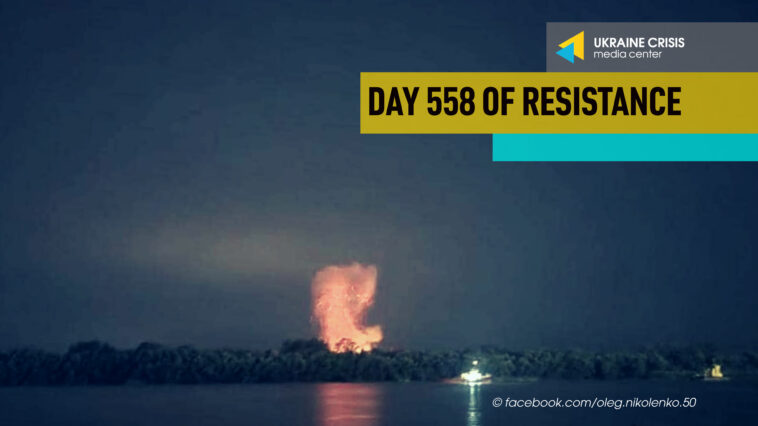Russian drones fall and detonate in Romania in an overnight attack on a Ukrainian border region, Ukraine says. Ukraine is to replace the defense minister.
Russian drones fall and detonate in Romania in overnight attack on Ukrainian border region, Ukraine says
Overnight on September 4, Russia launched another major drone attack on southern Ukraine. According to Ukraine’s State Border Guard Service, some Iranian-made Russian drones fell and detonated in Romania, a NATO member.
Ukraine’s Air Force said it had shot down 23 out of 32 Iranian-made Shahed drones. Drones hit targets in Odesa and Dnipropetrovska regions. Russia targeted critical infrastructure facilities in the Izmail district in Odesa region that borders Romania.
During a major Russian attack near the port of Izmail, Shahed drones fell and detonated on the territory of Romania, spokesperson for Ukraine’s Foreign Ministry Oleh Nikolenko said, quoting reports from the State Border Guard Service of Ukraine.
“This is yet another confirmation that Russia’s missile terror poses a huge threat not only to Ukraine’s security, but also to the security of neighboring countries, including NATO member states,” Nikolenko said.
He called on Ukraine’s allies to speed up the delivery of air and missile defense systems, and send fighter jets to Ukraine. This move will bolster security of critical infrastructure facilities in Ukraine and its neighbors, he added.
Ukraine’s State Border Guard Service observed two detonations on the territory of Romania during the Russian attack overnight and relayed the information to its Romanian counterparts, but received no reply.
Romania’s Defense Ministry “categorically denied” that Russian drones fell in Romania’s territory overnight on September 4.
The Ministry observed Russia’s attack on critical infrastructure facilities near Ukrainian ports on the Danube in real time, it said on Facebook.
“At no time did the means of attack used by Russia pose a direct military threat to Romania’s national territory or territorial waters,” Romania’s Defense Ministry said.
Defense Minister Oleksiy Reznikov to be replaced with Rustem Umerov
On September 3, President Zelenskyi said that he would ask the Parliament to replace Defense Minister Oleksiy Reznikov with Rustem Umerov.
Umerov has headed the State Property Fund since September 2022. He ran for parliament with Holos (Voice) party and was elected as MP in 2019.
Reznikov’s sacking follows a handful of procurement scandals in the Defense Ministry in which officials were accused of profiteering over purchasing of food and jackets at inflated prices. Reznikov was never implicated.
Umerov, a Crimea Tatar, is an advisor to Crimean Tatar leader, Mustafa Dzhemilev. In 1944, Umerov’s family was forcibly deported from their native land in Crimea to Siberia and Central Asia, the fate of Crimean Tatars in the peninsula under the Soviet rule.
Ukrainian military journalist Yuriy Butusov is critical of Umerov’s appointment, calling him “someone who is distant from the war”.
“The only thing that changes is the name. At the same time the president will be for a while protected from corruption scandals and incompetent management decisions of Reznikov by promises that the new minister will solve old problems,” Butusov said. The candidate for the minister doesn’t have a plan or understanding of what to do, he added.
Daria Kaleniuk, executive director of the Anti-Corruption Action Center, said she was pleasantly surprised by Umerov’s role in non-public advocacy of weapons for Ukraine.
“He often very quietly did the things that had failed in the Defense Ministry during the last year and a half. Rustem is one of a few in the government who has an overall strategic vision of the defense sector and the country’s defense. [He is] a manager experienced in managing complex teams that the Defense Ministry, unfortunately, didn’t have in the past year and a half,” Kaleniuk said.
“The very fact a Crimean Tatar was appointed as the minister of defense is a powerful message to the world of how Ukraine plans to end the war,” Kaleniuk wrote.
Vitaliy Shabunin, head of the board of the Anti-Corruption Action Center, said the appointment of Umerov as minister of defense will probably be the president’s best decision. “His previous accomplishments best speak of his future actions in office,” Shabunin said, disagreeing with Butusov.
“First, since the first day of war, Umerov has headed a non-public negotiation line on the supply of heavy weapons. Second, since February 2022, Umerov has been an important member of a group that negotiates the release of prisoners of war and that has liberated more than two thousand Ukrainian troops, including service members from the Azovstal garrison.”
“And one more important thing. With this appointment, Zelenskyi puts a final twist on the attempts by anyone, including our allies, to force us into ceding Crimea,” Shabunin said.
Decoding Russian Propaganda: The Power of Memes. Ukraine in Flames #502
A meme serves a purpose beyond mere amusement. It functions as a building block of cultural information, similar to an informational virus capable of influencing an individual’s perception of reality, their worldview, and behavior. It’s important to acknowledge that Ukrainians and russians have been engaging in meme warfare, as we understand it today, since approximately 2004. In fact, our battle of memes has persisted throughout the entirety of the contemporary conflict between Ukraine and russia. Watch Ukraine in flames #502 to find out about memes and humor as distinct forms of communication, as well as an exploration of war propaganda, with a primary emphasis on the key narratives found within russian memes.
Guests:
- Petro Oleschuk, Political Scientist, Lecturer at Shevchenko National University (Kyiv)
- Anton Khimyak, HWAG Analyst of Ukraine Crisis Media Center
- Volodymyr Solovian, Senior HWAG Analyst, Project Manager at The New Geopolitics Research Network




